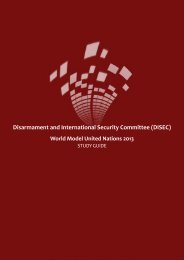Social, Humanitarian and Cultural Committee (SOCHUM)
Social, Humanitarian and Cultural Committee (SOCHUM)
Social, Humanitarian and Cultural Committee (SOCHUM)
You also want an ePaper? Increase the reach of your titles
YUMPU automatically turns print PDFs into web optimized ePapers that Google loves.
<strong>and</strong> strategies for exercising their<br />
right to development. In particular,<br />
indigenous peoples have the right<br />
to be actively involved in developing<br />
<strong>and</strong> determining health, housing<br />
<strong>and</strong> other economic <strong>and</strong> social<br />
programmes affecting them <strong>and</strong>, as<br />
far as possible, to administer such<br />
programmes through their own<br />
institutions.” 194<br />
thus, the declaration on the Rights of indigenous<br />
Peoples makes a strong statement in favor of<br />
assisting the development of indigenous groups<br />
through measures that cater to their needs <strong>and</strong><br />
circumstances.<br />
the declaration on the Rights of indigenous<br />
Peoples also deals directly with a number of the<br />
causes of impoverishment in indigenous communities<br />
that were discussed above. Articles 18 <strong>and</strong> 19, for<br />
example, call on states to include indigenous peoples<br />
in the decision-making process on issues that affect<br />
them through inclusion in representative bodies <strong>and</strong><br />
consultation with indigenous institutions. Article<br />
21 protects “the right, without discrimination, to<br />
the improvement of their economic <strong>and</strong> social<br />
conditions,” including in the areas of employment,<br />
housing, <strong>and</strong> sanitation. 195 A number of different<br />
articles discuss the issue of indigenous l<strong>and</strong> rights.<br />
Article 10 states that indigenous peoples shall not<br />
be removed from their l<strong>and</strong> without consent <strong>and</strong> fair<br />
compensation. Article 26 gives indigenous peoples<br />
the rights to the l<strong>and</strong>s that they have traditionally<br />
occupied <strong>and</strong> used <strong>and</strong> calls upon states to give<br />
legal recognition to these claims. Finally, Article 27<br />
encourages governments to set up processes for<br />
adjudicating local l<strong>and</strong> rights disputes. 196<br />
As evident in this brief description of the previous<br />
international action on the impoverishment of<br />
indigenous peoples, there is a strong precedent for<br />
protecting the right of indigenous groups to equal<br />
opportunities for development. The dire conditions<br />
in which many indigenous peoples find themselves<br />
today, however, suggest that this legal <strong>and</strong><br />
theoretical precedent is not enough. In order to solve<br />
this problem, more calls for the protection of various<br />
human rights will not be enough; the international<br />
community must instead implement concrete plans<br />
<strong>and</strong> policies for reducing poverty among indigenous<br />
populations.<br />
Possible Solutions<br />
As suggested in the discussion of the problems<br />
with the framework of the Millennium Development<br />
Goals, the first step in solving the issue of poverty<br />
among indigenous peoples is the creation of a<br />
system for gathering more information on the<br />
situations that indigenous peoples face <strong>and</strong> for<br />
underst<strong>and</strong>ing the specific circumstances of<br />
each group. First, instead of broad statistics for<br />
development indices across the entire population, it<br />
is necessary for countries to collect disaggregated<br />
data for indigenous groups. 197 Collecting information<br />
specific to indigenous people would also encourage<br />
improved data collection techniques in general.<br />
Having better data on indigenous populations would<br />
raise awareness among the international community<br />
on the issues facing these groups <strong>and</strong> would provide<br />
an impetus for the implementation of policies that<br />
are specifically targeted toward them. 198 in addition<br />
to quantitative data, it is also vital to underst<strong>and</strong> the<br />
different circumstances that lead to poverty among<br />
various indigenous populations. Some populations<br />
are impoverished because they live in remote areas<br />
without access to infrastructure <strong>and</strong> basic services;<br />
others, because governments <strong>and</strong> private investors<br />
have taken their local l<strong>and</strong>s for development projects.<br />
Plans <strong>and</strong> policies for improving the economic<br />
situation of a specific population will, of course,<br />
depend on the causes that lead to impoverishment<br />
45<br />
Melbourne Host Directorate PTY LTD | Office of Media <strong>and</strong> Design

















